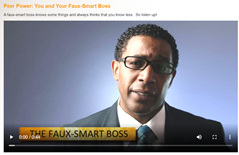Cynthia Clay's Blog
Working Well with a Faux-smart Boss
Wednesday, September 30, 2020

The faux-smart boss has great confidence in his own skills, knowledge and abilities, likely based on some past successes. What makes this a difficult pattern to handle at work is that faux-smart bosses are often blind to their lack of knowledge or skill regarding current problems or issues. Buoyed by his track record, he may mistrust the skills of his employees and demand that they comply with his directives.
A Faux-smart Boss's Story
Meet John, a faux-smart boss who has just assumed a new role with authority over several work teams. Convinced that he understands the division's priorities and issues, John immediately sets about "cleaning house," dismissing processes and procedures he considers to be unnecessary, and putting a new organizational structure in place. His direct reports (all managers) have many years of combined experience but now find that their boss never consults them or asks their input. They often learn of the latest directive after John has announced the change at a staff meeting. Frustrated by John's over-confidence and his unwillingness to listen to other viewpoints, they are also concerned that key employees with years of experience are ready to bolt.
Let's look at a few clues that indicate the presence of a faux-smart boss. From his position of power and leadership, he:
-
- Argues when others give input
- Insists upon doing things his way
- Makes impulsive and unwise decisions
- Micromanages his employees
- Asks his employees to ignore company policies or procedures
- Takes back tasks once delegated
- Rates his employees too critically
- Hires employees who tend to agree with him
- Shows favoritism to people who agree with him
- Refuses to acknowledge mistakes
It's possible that John, in his attempt to prove himself in his new role, may:
-
- Feel humiliated when he is exposed as unknowledgeable
- Be insecure about his job or himself
- Feel uncomfortable with change
- Base his self-esteem on a display of expertise
- Feel pressured by a work culture that rewards the wrong priorities
Because a faux-smart boss may define himself by the work he does and the opinions he holds, it's important not to undermine them or diminish their self-esteem.
 To hear a faux-smart boss in action, watch this short video at NetSpeed Fast Tracks.
To hear a faux-smart boss in action, watch this short video at NetSpeed Fast Tracks.
There are three principles that can help you work with a faux-smart boss to help him develop into a knowledgeable leader: Take Responsibility, Extend Respect, and Be Real.
Take Responsibility
-
- Focus on what you can do. Don't become a whiner.
- Communicate frequently with your boss. Ask his opinions.
- Help your boss succeed.
- Respect your needs. Honor your own accomplishments.
- Perform well (so your boss will have confidence in you).
- Prepare thoroughly when presenting your ideas.
Extend Respect
-
- Honor differences. Adapt to your boss's style.
- Listen to clarify your boss's expectations.
- Be loyal. Correct misinformation but don't undermine.
- Respect the organization's culture.
Be Real
-
- Express what is on your mind.
It is possible to have a productive, satisfying working relationship with a faux-smart boss. It may require that you partner with him, providing useful articles, assuring him of your support, and asking questions to help him probe more deeply before coming to a conclusion.
The Rest of the Story
John was surprised by the resignation of two key employees who left to work with a competitor of the company. Pauline, one of his direct reports, encouraged him to call a management team meeting to explore some avenues to increase employee satisfaction in the division. She offered to research employee satisfaction issues and presented John and the management team with a report summarizing key satisfiers that increase employee retention.
 In the meeting, Pauline was careful not to confront John on his management directives. Instead she asked probing questions, such as, "What do we do particularly well in this division compared to the recommendations I discovered in this research?" and "What improvements might we make to increase employee retention here?" John spoke aloud several observations about the impact of moving so quickly to restructure the division. While he didn't directly acknowledge that he might have made any leadership mistakes, he asked the management team to prepare a plan to increase employee satisfaction and retention.
In the meeting, Pauline was careful not to confront John on his management directives. Instead she asked probing questions, such as, "What do we do particularly well in this division compared to the recommendations I discovered in this research?" and "What improvements might we make to increase employee retention here?" John spoke aloud several observations about the impact of moving so quickly to restructure the division. While he didn't directly acknowledge that he might have made any leadership mistakes, he asked the management team to prepare a plan to increase employee satisfaction and retention.
Listen to the audio recording to hear how to respond constructively when working with a faux-smart boss who has jumped to a conclusion. (Click on the link above and scroll down to the bottom of the page to listen to the short audio recording.)
This article is based on Peer Power: Transforming Workplace Relationships by Cynthia Clay and Ray Olitt. Read a sample chapter to learn about the mistakes they've made in their past communication practices.
Posted by Cynthia Clay at 11:03 am




